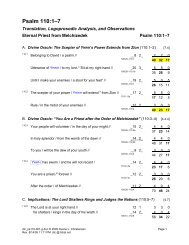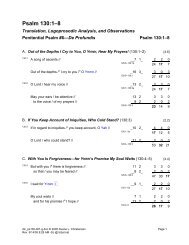Reading Genesis 1-2 in Hebrew - Bibal.Net
Reading Genesis 1-2 in Hebrew - Bibal.Net
Reading Genesis 1-2 in Hebrew - Bibal.Net
Create successful ePaper yourself
Turn your PDF publications into a flip-book with our unique Google optimized e-Paper software.
<strong>Read<strong>in</strong>g</strong> <strong>Genesis</strong> 1–2 <strong>in</strong> <strong>Hebrew</strong><br />
����������������������‹<br />
�������������������������������������•���1:12�<br />
������������„�‘����•���û������ô���π‘���������‡<br />
��������<br />
������‘��ƒ���„ ���������û•œ•�����<br />
���������������������‹<br />
�������������������������������������•��—transliteration:<br />
waT-TÙ-cEµ' hA-'Aµ-rec Deµ-He' vEµ-Web<br />
mazrÓµav zeµrav l¸mÓnEµh˚, “and the earth brought forth vegetation, plants yield<strong>in</strong>g seed after their<br />
k<strong>in</strong>d.” The verb here is Hiphil (causative) imperfect 3 rd sg. fem. from the root 'cy (“go forth”).<br />
The form 'EcÙLt is for 'Ec¸wLat, which like 'EH⁄dLat, has añ under the preformative and is causative.<br />
Note the compensatory lengthen<strong>in</strong>g of the vowel <strong>in</strong> the first syllable of the def<strong>in</strong>ite noun erA'Ah<br />
(“the earth”) because the ' cannot be doubled. On the next four words, see the discussion<br />
above at 1:11. The word ˚hEnyim¯l is an uncontracted form, with the same mean<strong>in</strong>g as ÙEnyim¯l (see<br />
1:11 above).<br />
�����������„�‘����•���û������ô���π‘���������‡<br />
����—transliteration: w¸-vEµc vO-Weh-P¸-rÓµ '‰-Heµr zar-vÙ-bÙµ<br />
l¸-mÓ-nEµ-h˚, “and trees bear<strong>in</strong>g fruit with seed <strong>in</strong> them after their k<strong>in</strong>d.” See the discussion at<br />
1:11 where the same words appear. The only real difference here is the maqqEp, which jo<strong>in</strong>s the<br />
words �ô���π‘�������(“bear<strong>in</strong>g<br />
fruit”) <strong>in</strong>to a s<strong>in</strong>gle word-stress unit and the use of the meteg to<br />
<strong>in</strong>dicate a secondary stress. on the first syllable.<br />
�����‘��ƒ���„ ���������û•œ•�‰—transliteration:<br />
way-yaµr' 'È-lO-hÓµm KÓ-XÙµb, “and Elohim saw that it was<br />
good.” The verb is Qal imperfect 3 rd sg. masc. with wau-conversive from the root h'r (“see”)<br />
with £yih»lÈ' (“Elohim”) as subject. On the phrase bÙX y– ik (“that it was good”), see 1:4a above.<br />
�������������������û������„�‘������•�����û��‘������•���1:13�<br />
�������������û������„�‘������•�����û��‘������•��—transliteration:<br />
way-y¸-hÓ-veµ-reb way-y¸-hÓ-bOµ-qer yÙµm<br />
H¸-lÓ-HÓµ, “and it was even<strong>in</strong>g and it was morn<strong>in</strong>g, Day Three.” Cf. discussion at 1:5b above.<br />
<strong>Genesis</strong> 1:14–31<br />
���������������������������������‹<br />
��������������������œ•���1:14�<br />
��������������������„œ�����û������������������<br />
��������������„ ��������������������������������‹���������<br />
��������������������������������‹<br />
��������������������œ•��—transliteration:<br />
way-yOµ'-mer 'È-lO-hÓµm y¸-hÓµ<br />
m¸-'O-rOµt Bir-qÓµ-av haH-HA-maµ-yim, “and Elohim said, ‘Let there be lights <strong>in</strong> the dome of the sky.”<br />
The first verb is the Qal imperfect 3 rd pl. masc. with wau-conversive from the root rm' (“say”)<br />
© 2005 BIBAL Corporation, All Rights Reserved Version 1.0<br />
10





